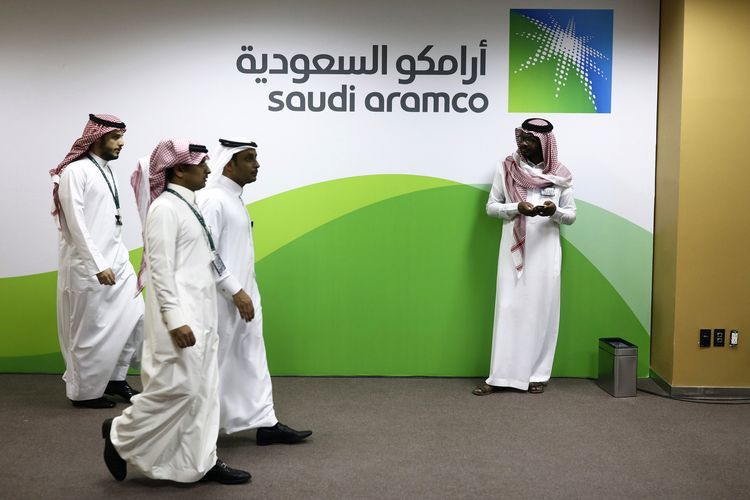
Saudi Arabia aims to sell about 5 percent of Saudi Aramco in an initial public offering next year, and stock exchanges from the U.K. to Japan are vying for what may be the world’s richest IPO.
The Saudi crown prince, Mohammed bin Salman, will soon decide where to sell the company’s shares after government officials heard a presentation on the listing process last week, according to people with knowledge of the matter. The kingdom plans to list on the Saudi stock exchange in Riyadh and sell shares on at least one bourse outside the country. That choice pits the top global financial centers, London and New York, against each other for a sale that could value the largest oil exporter at as much as $2 trillion.
The Saudis and their advisers want to pick a foreign exchange or exchanges with similar listing and regulatory requirements to the Riyadh bourse, to avoid large deviations in pricing between the markets, according to other people familiar with the situation.
Here’s a rundown of some pros and cons for Saudi Arabian Oil Co., as the company is formally known, in choosing to list in London, New York, Hong Kong, Tokyo, Singapore or Toronto — the six main contenders for the prize.
London
London improved its chances when regulators overseeing the London Stock Exchange proposed rule changes last month that would make it easier for governments to list their state-backed entities, according to the people with knowledge of the plans to decide soon on Aramco’s listing. The changes would allow Aramco’s shares to trade on the LSE’s premium segment, with access to a wider pool of investors than a standard listing.
The proposals would also eliminate a requirement that sovereign-controlled companies list at least 25 percent of their shares to be eligible for the premium segment. That’s a big concession to the Saudis, who have said they plan to sell about 5 percent of the company.
However, the Institute of Directors, a leading U.K. business group, opposes the changes as unjustified, saying the proposals mustn’t diminish London’s reputation for corporate governance. The institute urged the Financial Conduct Authority to reconsider the proposals, its director general said in an emailed statement.
The IPO would give a welcome boost to London’s reputation as a financial center, given the U.K.’s plans to leave the European Union. But for Aramco, Brexit could tarnish London’s appeal by reducing the number of potential buyers of the company’s shares.
New York
New York’s appeal to the Saudis as the financial hub of the world’s largest economy is enhanced by the relationship Prince Mohammed has cultivated with U.S. President Donald Trump. Aramco has been one of three biggest crude suppliers to the U.S. over the last four decades. The company also owns the largest U.S. refinery, a plant in Port Arthur, Texas, through its wholly owned subsidiary Motiva Enterprises LLC.
One risk to an Aramco listing in New York is a U.S. law allowing victims of terrorism to sue foreign governments linked to attacks. Fifteen of the 19 hijackers who carried out the Sept. 11, 2001, attacks in the U.S. were Saudi citizens, and advisers to the company say that American officials have provided little assurance that Aramco wouldn’t be a target of litigation, according to the people with knowledge of the situation.
Aramco is also evaluating a risk of broader litigation in the U.S. that could emerge, for example, with shareholders lawsuits targeting the company over environmental concerns, according to the people familiar with how the Saudis and their advisers are assessing the listing options.
Hong Kong
Aramco sells two-thirds of its oil to Asia, with China one of its biggest buyers. The company has a refining joint venture in Fujian, China, and is in talks to start two more plants in the country. Saudi and Chinese officials agreed to look at $65 billion in potential energy and infrastructure deals when King Salman visited China in March. This close involvement could work in favor of a listing in Hong Kong, home to China’s largest bourse that accepts IPOs by companies based in other countries.
China Investment Corp., the nation’s sovereign wealth fund, could take part in an Aramco IPO, people with knowledge of the matter said in March. Two of China’s state oil companies also may buy shares in Aramco, according to their senior executives.
Trading links enabling investors in mainland China to buy shares listed in Hong Kong could further strengthen the case for Aramco to list in the terrritory.
Still, Hong Kong’s exchange, like those in Tokyo and Singapore, is smaller than markets in New York or London. This raises the question of whether the Asian bourses could provide enough investor interest to value Aramco at the level the Saudis want, according to the people familiar with how the kingdom and its advisers are assessing the listing options.
Tokyo and Singapore
Exchanges in both Asian cities made aggressive pitches to Saudi authorities for the IPO, though neither Japan nor Singapore consumes as much crude oil as China.
A listing in Japan, where Aramco owns shares in a refiner as well as facilities to store crude, would enable the company to tap into a separate investor pool it can’t access in New York, London or Hong Kong, Akira Kiyota, Japan Exchange Group’s chief executive, said in July.
Singapore is the biggest oil trading center in Asia. The Singapore Exchange is the smallest of the bourses competing to list Aramco shares, but it’s said to be planning a slew of incentives to lure a listing. The island nation is said to be studying proposals including inviting one of its state investment companies to become a cornerstone investor.
Toronto
The Toronto Stock Exchange is also among the smaller contenders for the IPO, but the Canadian bourse has highlighted the large number of commodities companies listed there. Energy and materials stocks account for about two-thirds of the TSX Venture index and a third of the S&P/TSX Composite Index.